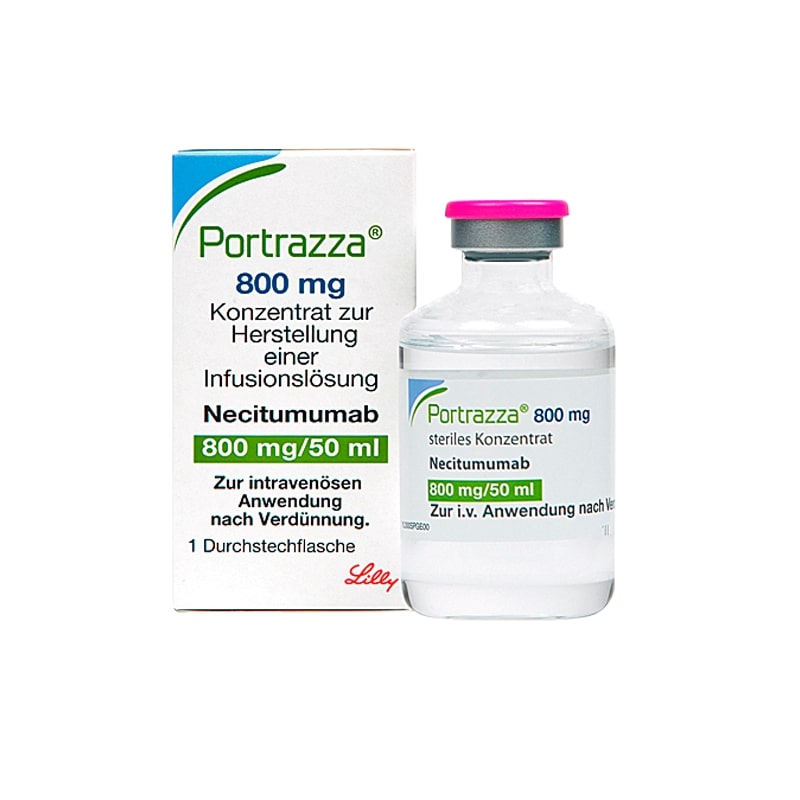Portrazza (necitumumab) vs Krazati (adagrasib)
Portrazza (necitumumab) vs Krazati (adagrasib)
Portrazza (necitumumab) is a monoclonal antibody designed to target and block the epidermal growth factor receptor (EGFR), which is often overexpressed in certain types of lung cancer, and is specifically approved for use in combination with chemotherapy for the treatment of metastatic squamous non-small cell lung cancer (NSCLC) that has not been previously treated. Krazati (adagrasib) is a small molecule inhibitor targeting the KRAS G12C mutation, which is a specific genetic alteration found in a subset of NSCLC tumors, and it is used for the treatment of adults with KRAS G12C-mutated locally advanced or metastatic NSCLC, as determined by an FDA-approved test, who have received at least one prior systemic therapy. When deciding between these two medications, it is crucial to consider the specific molecular characteristics of the lung cancer, as Portrazza is not specific to any genetic mutation, while Krazati is tailored for tumors harboring the KRAS G12C mutation.
Difference between Portrazza and Krazati
| Metric | Portrazza (necitumumab) | Krazati (adagrasib) |
|---|---|---|
| Generic name | Necitumumab | Adagrasib |
| Indications | Metastatic squamous non-small cell lung cancer (NSCLC) | Non-small cell lung cancer (NSCLC) with KRAS G12C mutation |
| Mechanism of action | Epidermal growth factor receptor (EGFR) antagonist | KRAS G12C inhibitor |
| Brand names | Portrazza | Krazati |
| Administrative route | Intravenous | Oral |
| Side effects | Rash, magnesium deficiency, venous thromboembolic events | Diarrhea, nausea, vomiting, fatigue |
| Contraindications | Hypersensitivity to necitumumab or its excipients | Hypersensitivity to adagrasib or its excipients |
| Drug class | Monoclonal antibody | Small molecule kinase inhibitor |
| Manufacturer | Eli Lilly and Company | Mirati Therapeutics, Inc. |
Efficacy
Efficacy of Portrazza (necitumumab) in Lung Cancer
Portrazza (necitumumab) is a monoclonal antibody that is specifically designed to target and block the activity of the epidermal growth factor receptor (EGFR), which is known to be involved in the growth and spread of cancer cells. It is approved for use in combination with chemotherapy for the treatment of patients with advanced squamous non-small cell lung cancer (NSCLC) who have not previously received medication for their metastatic lung cancer. Clinical trials have demonstrated that when necitumumab is added to a standard chemotherapy regimen of gemcitabine and cisplatin, there is a statistically significant improvement in overall survival compared to chemotherapy alone. However, it is important to note that the efficacy of necitumumab can vary based on the presence of certain genetic mutations, and it is not indicated for patients whose tumors have EGFR mutations or other non-squamous histologies.
Efficacy of Krazati (adagrasib) in Lung Cancer
Krazati (adagrasib) is a small molecule kinase inhibitor that targets KRAS G12C mutations, which are present in a subset of non-small cell lung cancers (NSCLC). KRAS mutations have been historically challenging to target with therapeutics, making adagrasib a significant advancement in the treatment of NSCLC with this specific mutation. The efficacy of Krazati in lung cancer has been evaluated in clinical trials involving patients with KRAS G12C-mutated NSCLC who have received at least one prior systemic therapy. In these studies, Krazati has shown promising anti-tumor activity, with a notable percentage of patients achieving partial responses and stable disease. The duration of response and progression-free survival data further support the potential of Krazati as a treatment option for this specific patient population.
It is critical for healthcare providers to identify the appropriate patient population for these therapies through biomarker testing. The use of Portrazza and Krazati is highly dependent on the molecular profile of the lung cancer, and their efficacy is maximized when used in the correct genetic context. As research continues, the therapeutic landscape for lung cancer is expected to evolve with the development of new targeted therapies and the optimization of treatment regimens.
In conclusion, both Portrazza (necitumumab) and Krazati (adagrasib) represent important options in the treatment of lung cancer, each within its specific indication. Portrazza has shown benefit in the overall survival of patients with advanced squamous NSCLC when combined with chemotherapy, while Krazati offers a new targeted approach for patients with KRAS G12C-mutated NSCLC. The efficacy of these drugs highlights the importance of personalized medicine and the need for precise molecular diagnostics in the management of lung cancer.
Regulatory Agency Approvals
Portrazza
-
European Medical Agency (EMA), European Union

-
Food and Drug Administration (FDA), USA

-
Health Canada

Krazati
-
Food and Drug Administration (FDA), USA

Access Portrazza or Krazati today
If Portrazza or Krazati are not approved or available in your country (e.g. due to supply issues), you can access them via Everyone.org.
How it works

Make an enquiry
Choose the medicine you want to buy, answer a couple of questions, and upload your prescription to speed things up. We’ll get back to you within 24 hours.


Make an enquiry
Choose the medicine you want to buy, answer a couple of questions, and upload your prescription to speed things up. We’ll get back to you within 24 hours.


Breeze through the paperwork
We'll guide you through the required documents for importing unapproved medicine, ensuring you have all the necessary information.


Get a personalized quote
We’ll prepare a quote for you, including medicine costs and any shipping, administrative, or import fees that may apply.


Receive your medicine
Accept the quote and we’ll handle the rest - sourcing and safely delivering your medicine.

Some text on this page has been automatically generated. Speak to your physician before you start a new treatment or medication.
Let's talk
If you have any questions, call us or send us a message through WhatsApp or email:
Contact us




